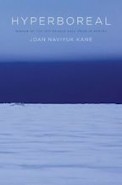
Book Review: Hyperboreal by Joan Naviyuk Kane
Hyperboreal
Poems by Joan Naviyuk Kane
University of Pittsburgh Press, October 2013
ISBN-13: 978-0822962625
$15.95; 80pp.
Reviewed by Alyse Bensel
Winner of the 2012 Donald Hill Prize in Poetry, Joan Naviyuk Kane’s Hyberboreal reverberates across the Alaskan landscape, navigating family and motherhood amidst an elemental and very real world. Here, sparse verse gives way to vivid imagery of fire, ice, snow, water, soil, and wood that accumulate agency and shape the lives of those who inhabit this place. “The Fire,” the speaker claims, “does choose / What it does not break.” Saturated yet never dense, Kane’s poems draw out a sustained vision of how to piece together a life sensory and ever present in unfolding love and loss.
In these poems, there is an intense desire to belong in the world and fully experience its movement. A meditating lyric, “Gorge” is rendered in five couplets, where the speaker describes the gorge as “What I cannot suppose / As part of another life—” while claiming to be “A small practitioner of earth, I am learned from this—”. Acknowledging how much is still be learned and yet never to be fully known, the speaker sees how natural and man-made creations in “Etch” are created: “He carved the light, though / The world remains // Unmoved.” Through contact with the bone of a whale’s eardrum, the speaker acknowledges “Listening, I began / To know so little.” For the speaker, this humility remains the first step in the desire to trying to understand the world in all of its manifestations.
A keen awareness of the injustice toward family and heritage, as well as tradition, filters throughout the collection through a defiant and fiercely loyal speaker who yet always remains deeply reflective of experience. Aware of the difficulties in communicating through language, the speaker intones in “Mother Tongues” how “I could make the passage / A thousand obscure, / Contradictory ways.” Furthermore, the cascading lines in “Disappear” mark the hit and run incident of an uncle, the “sister twenty at suicide,” an ailing grandfather mistaken for a drunk and jailed, all of whom are interspersed with a prayer that ends “for the sea is very deep // land’s end nunam izua // let us set the last stone in place.” A longing peaks in seeking out family—in “Time and Time Again,” the speaker observes “in the days before your birth / your heart beat out some worry // in our two rooms above two tinmiagṙuat” before “we lost sight of land altogether // through failure to keep the shore.”
Quiet but never silent, Hyperboreal embodies the landscape it seeks to represent. Through observation and lived experience, these poems are indicative of an ever-watched and yet not always understood world. Here there is existence where humans are only a fragment.
Alyse Bensel is the Book Review Editor at The Los Angeles Review and Co-Editor of Beecher’s. She is the author of the poetry chapbooks Shift (Plan B Press, 2012) and Not of Their Own Making (dancing girl press, forthcoming 2014). Her poetry has recently appeared in Cold Mountain Review, Blue Earth Review, Ruminate, and The Fourth River, among others. She is a PhD candidate in creative writing at the University of Kansas

